Top Lung Transplant Surgeons in Artemis Hospital Gurgaon
 09 January,2026
Read More
09 January,2026
Read More
Starting From: USD 2500-9500
Procedure Type: Surgical Procedure
Hospitalization Days: 3-4 Days
Procedure Duration: 2-4 Hrs
Recovery Time: 2-10 Weeks
Success Rate: 99%
The cost of prostate cancer treatment in India starts from INR 2,10,000 to INR 8,00,000 (approximately USD 2,500 to USD 9,500), though the actual cost depends on the type of treatment surgery, radiation, chemotherapy, stage, and severity of the cancer, hospital's location etc.
Here is an overview of affordable prostate cancer treatment in India in major cities. USD equivalents are approximate and may vary with the exchange rate.
|
City |
Min Cost (INR) |
Max Cost (INR) |
Min Cost (USD) |
Max Cost (USD) |
|
New Delhi |
INR 2,50,000 |
INR 6,00,000 |
USD 3,000 |
USD 7,200 |
|
Mumbai |
INR 2,75,000 |
INR 7,00,000 |
USD 3,300 |
USD 8,400 |
|
Bengaluru |
INR 2,50,000 |
INR 6,50,000 |
USD 3,000 |
USD 7,800 |
|
Chennai |
INR 2,25,000 |
INR 5,50,000 |
USD 2,700 |
USD 6,600 |
|
Hyderabad |
INR 2,00,000 |
INR 6,00,000 |
USD 2,400 |
USD 7,200 |
|
Kolkata |
INR 1,30,000 |
INR 5,25,000 |
USD 1,500 |
USD 6,300 |
|
Pune |
INR 2,20,000 |
INR 5,00,000 |
USD 2,600 |
USD 6,000 |
|
Ahmedabad |
INR 2,10,000 |
INR 4,75,000 |
USD 2,500 |
USD 5,700 |
|
Chandigarh |
INR 2,00,000 |
INR 4,50,000 |
USD 2,400 |
USD 5,400 |
|
Gurugram |
INR 2,50,000 |
INR 6,50,000 |
USD 3,000 |
USD 7,800 |
Metros generally have broader cost brackets because of a higher density of high-end hospitals. Tier-2 cities can offer slightly lower prices while still delivering quality care. It is always recommended to consult a healthcare provider for precise cost estimates.
Prostate cancer is one of the common types of cancer affecting men. It mainly develops in the prostate gland, which is a small, walnut-shaped organ found below the bladder and in front of the rectum. The prostate is one of the vital organs of men, which helps in producing seminal fluid and transporting sperm. The prostate cancer treatment cost in India is quite affordable, with a combination of great hospitals and doctors.
Surgery is one of the common treatment options for men who have localised prostate cancer. In this type of cancer, the surgical intervention generally includes the removal of the prostate, and if needed, the affected adjacent tissues are also removed. A widely performed procedure is radical prostatectomy, which entails the complete removal of the prostate.
A more sophisticated approach is robotic-assisted surgery, enhancing precision and facilitating faster recovery. In certain situations, physicians may suggest transurethral resection of the prostate (TURP) to alleviate urinary issues stemming from an enlarged prostate, although this procedure is not aimed at curing the cancer.
Other parts of prostate cancer treatment include several options based on the cancer's stage and patient health. Radiation therapy uses high-energy rays to destroy cancer cells and is delivered through External Beam Radiation Therapy (EBRT) or Brachytherapy, where radioactive seeds are implanted into the prostate.
Hormone therapy, or androgen deprivation therapy, lowers testosterone levels to slow cancer growth, either through medications like LHRH agonists or through orchiectomy, the surgical removal of the testicles. Chemotherapy is used to kill rapidly growing cancer cells in advanced or hormone-resistant cases, while immunotherapy helps the immune system recognise and attack cancer cells.
Prostate cancer surgery is recommended for:
Always consult a doctor to understand if you are the right candidate for this surgery and to get an idea of the prostate cancer treatment cost in India.
Prostate cancer treatment costs in India can broadly be categorized into the following approximate ranges:
These figures generally cover routine prostate cancer surgeries performed without complications.
|
Treatment Type |
Cost (INR) |
Cost (USD) |
|
Radiation Therapy |
INR 1,50,000 – INR 3,00,000 |
USD 1,800 – USD 3,600 |
|
Hormone Therapy |
INR 1,00,000 – INR 3,00,000 |
USD 1,200 – USD 3,600 |
|
Chemotherapy |
INR 1,00,000 – INR 2,50,000 |
USD 1,200 – USD 3,000 |
|
Immunotherapy |
INR 80,000 – INR 4,50,000 |
USD 960 – USD 5,400 |
|
Surgical Procedure |
INR 1,50,000 – INR 2,50,000 |
USD 1,800 – USD 3,000 |
Various factors can influence the prostate cancer cost in India, either increasing or decreasing it. The main factors affecting prostate cancer treatment cost in India include:
1. Type of Surgery: Surgery done with robotic assistance is quite expensive compared to traditional procedures.
2. Stage of Cancer: Earlier stages may need only surgery; advanced cases require chemoradiation or targeted therapy.
3. Hospital Choice: NABH-accredited or JCI-certified hospitals with oncology departments charge higher but offer premium care.
4. Oncologist Experience: Highly reputed surgical and medical oncologists may charge more for their expertise.
5. Additional Therapies: Chemotherapy cycles, radiation sessions, and brachytherapy increase total expenditure.
Medical tourists often compare multiple destinations for the best combination of cost and expertise. Below is a generalized comparison:
|
Country |
Approx. Range (USD) |
|
India |
USD 2,500 – USD 9,500 |
|
Turkey |
USD 6,500 – USD 12,000 |
|
Thailand |
USD 12,000 – USD 30,000 |
|
UAE |
USD 8,000 – USD 15,000 |
|
UK |
USD 19,000 – USD 25,000 |
|
USA |
USD 28,000 – USD 80,000 |
India remains a preferred destination for affordable oncology care with internationally accredited hospitals and multilingual support.
1. Consultations & Diagnostic Tests:
India delivers advanced prostate cancer care, supported by extensive insurance coverage options for prostate cancer costs. Numerous health insurers nationwide offer critical illness and cancer-specific policies that cover significant treatment costs, including hospitalization, surgery (such as prostatectomy), hormone therapy, radiation therapy (including advanced techniques like IMRT or brachytherapy), chemotherapy, immunotherapy, diagnostic tests (e.g., PSA screenings), ICU care, and in-hospital medications.
For international patients, India’s top-tier cancer hospitals often accept global health insurance plans. These policies typically cover advanced therapies, such as robotic-assisted surgery or precision radiation, provided the chosen Indian hospital is within the insurer’s network. Pre-authorization and submission of medical records are generally required for treatment approval.
These simple tips can help you get affordable prostate cancer treatment in India.
Facing prostate cancer treatment in a foreign country can feel daunting. At MediJourney, we’re here to ease your journey. We are not just medical coordinators but caring partners who truly understand what you’re going through.
Your worries are our priority. Whether you’re searching for the best prostate cancer specialist, exploring treatment options, or navigating travel and accommodation, our team stands by you with unwavering support. We connect you with India’s top oncologists and ensure that language barriers or logistical challenges never add to your stress.
At MediJourney, we believe healing begins when you can focus on recovery, not paperwork, hospital transfers, or financial concerns. We handle every detail with the same dedication we’d offer our own loved ones.
Our commitment is simple: to make your prostate cancer treatment cost in India not only world-class and affordable but also transparent and fully supported every step of the way. Contact us today.
Answer: The average cost ranges between INR 2,10,000 and INR 8,00,000 (USD 2,500 to USD 9,500), depending on the treatment type and hospital.
Answer: Key factors include:
Answer: Yes, early-stage cancer costs less with localized treatments, while advanced stages require combined therapies, increasing the cost.
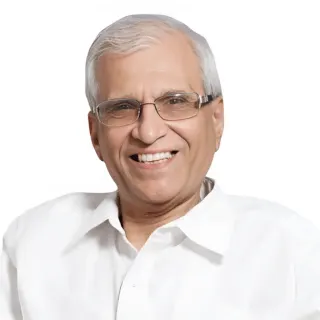
Senior Consultant
Medical Oncologist
Nanavati Super Specialty Hospital, Mumbai
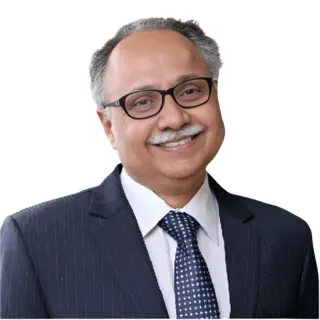
Chairman
Surgical Oncologist
Max Super Speciality Hospital, Saket, New Delhi
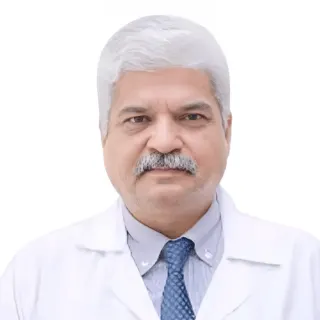
Senior Director
Surgical Oncologist
Kokilaben Dhirubhai Ambani Hospital, Mumbai & Medical Research Institute
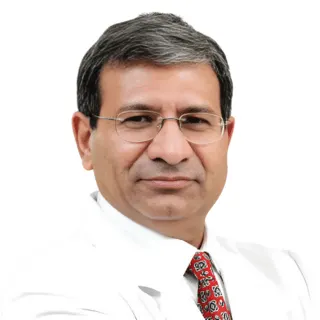
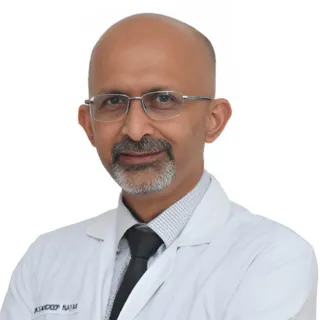
Senior Director
Surgical Oncologist
Fortis Hospital, Bannerghatta Road, Bangalore
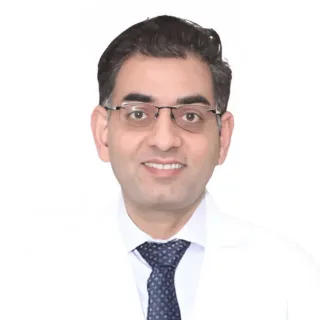
Vice Chairman
Robotic Surgeon, Surgical Oncologist
BLK-Max Super Speciality Hospital, New Delhi
Doctor of Pharmacy
Dr. Deepanshu Siwach is a skilled clinical pharmacist with a Doctor of Pharmacy degree.?He has 4+?years of experience and has worked with thousands of patients. He has been associated with some of the top hospitals, such as Artemis Gurgaon.
Dr. Deepanshu Siwach is a skilled clinical pharmacist with a Doctor of Pharmacy degree.?He has 4+?years of experience and has worked with thousands of patients. He has been associated with some of the top hospitals, such as Artemis Gurgaon....
Senior Director
Medical Oncologist
Dr. Sajjan Rajpurohit is a leading medical oncologist in New Delhi. With over 22 years of experience in cancer treatment, he has performed more than 15,000 immunotherapy cycles. His specializations include immunotherapy, targeted therapy, and chemotherapy for solid tumors (breast, lung, gastrointestinal, genitourinary, head and neck, and sarcoma)....
The Art of Effective Communication
 09 January,2026
Read More
09 January,2026
Read More
 02 January,2026
Read More
02 January,2026
Read More
 30 December,2025
Read More
30 December,2025
Read More
 24 December,2025
Read More
24 December,2025
Read More
 23 December,2025
Read More
23 December,2025
Read More
 17 December,2025
Read More
17 December,2025
Read More